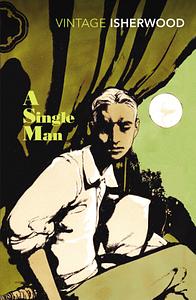Take a photo of a barcode or cover
Intersection of misogyny and male homosexuality is depicted so compellingly here. Much to think about.
“You have to find it out for yourself. I’m like a book you have to read. A book can’t read itself to you. It doesn’t even know what it’s about. I don’t know what I’m about.”
Christopher Isherwood’s ‘A Single Man’ follows George, a gay middle-aged English professor, around for a day during the grieving of his partner Jim, who died in a motor vehicle accident a few months prior. The novel takes place right after the Cuban Missile Crisis so it has fairly political statements like, “A place where the police are angels has to be an insane asylum,” which I love. But it is also quite romantic, with these long poetic sections that begin with “Think of two people living together,” and ending with “Jim is dead. Is dead.”
I would describe George as a grumpy old gay professor, and he has many reasons to be grumpy. Grumpy at society for how gay people are treated during the 60s. Grumpy at his students for not doing required reading. Grumpy at life for taking his love away from him. But in the course of these 24 hours, which is like a speed run of the grievance process, he gets a better understanding and appreciation of what it means to be living and what it means to continue living after someone you loved has died.
This is, I believe, the second Isherwood novel I’ve read to date, and he is slowly growing to be one of my favs.
Christopher Isherwood’s ‘A Single Man’ follows George, a gay middle-aged English professor, around for a day during the grieving of his partner Jim, who died in a motor vehicle accident a few months prior. The novel takes place right after the Cuban Missile Crisis so it has fairly political statements like, “A place where the police are angels has to be an insane asylum,” which I love. But it is also quite romantic, with these long poetic sections that begin with “Think of two people living together,” and ending with “Jim is dead. Is dead.”
I would describe George as a grumpy old gay professor, and he has many reasons to be grumpy. Grumpy at society for how gay people are treated during the 60s. Grumpy at his students for not doing required reading. Grumpy at life for taking his love away from him. But in the course of these 24 hours, which is like a speed run of the grievance process, he gets a better understanding and appreciation of what it means to be living and what it means to continue living after someone you loved has died.
This is, I believe, the second Isherwood novel I’ve read to date, and he is slowly growing to be one of my favs.
Beautifully written -- very unique prose. Artfully demonstrates 24-ish hours in a grieving man's life. Ahead of its time. A quick but thoughtful read.
Note: Differs from the movie and is perhaps better in some of its choices (though I do love the movie, as well).
Note: Differs from the movie and is perhaps better in some of its choices (though I do love the movie, as well).
A Single Man was the second book I listened to during my drive back from Minnesota to Massachusetts. It covered The final leg of my journey, from Buffalo to Milton. I don’t have many thoughts with regards to the audiobook format here; I did not like or dislike the voice actor—he was just some British man.
The tone at the beginning of the book is pretentious and annoying, but once it gets past that it greatly improves. This novel is probably the closest I have gotten to reading one of those modernist stream of consciousness novels. This is not actually one, but it is completely wrapped up in the mind of the narrator George as it covers a single day in his life as he grapples with the death of his partner. It is completely made up of his own opinions and biases—sometimes they’re funny or horrible or both, but he’s very honest. The way we get so close to his thoughts while he briefly forgets about his mourning before the death snaps back into focus feels realistic. Moreover, his reflections on aging and his relationships with others are full, revealing satisfaction, annoyance, disappointment, and more.
This book reads like an artifact with its look at a California that is still being developed and envisioning a prosperous future. I will note here also that George is racist, which is not surprising, but be ready for it if you should pick this up.
Spoiler warning for what is below:
I hated the end, wherein he goes to sleep, has a heart attack, and dies. The final scenes seemed to suggest that this novel was meant as an affirmation of life, so his death kind of ruined my reading and added nothing for me. In fact, I had to go back and relisten to make sure I understood it correctly. Personally I think he should have just gone to sleep and left it there—one emotional day followed by relief and a new day. I think the author just want the ending to be sad and deep, but it just felt contrived.
The tone at the beginning of the book is pretentious and annoying, but once it gets past that it greatly improves. This novel is probably the closest I have gotten to reading one of those modernist stream of consciousness novels. This is not actually one, but it is completely wrapped up in the mind of the narrator George as it covers a single day in his life as he grapples with the death of his partner. It is completely made up of his own opinions and biases—sometimes they’re funny or horrible or both, but he’s very honest. The way we get so close to his thoughts while he briefly forgets about his mourning before the death snaps back into focus feels realistic. Moreover, his reflections on aging and his relationships with others are full, revealing satisfaction, annoyance, disappointment, and more.
This book reads like an artifact with its look at a California that is still being developed and envisioning a prosperous future. I will note here also that George is racist, which is not surprising, but be ready for it if you should pick this up.
Spoiler warning for what is below:
I hated the end, wherein he goes to sleep, has a heart attack, and dies. The final scenes seemed to suggest that this novel was meant as an affirmation of life, so his death kind of ruined my reading and added nothing for me. In fact, I had to go back and relisten to make sure I understood it correctly. Personally I think he should have just gone to sleep and left it there—one emotional day followed by relief and a new day. I think the author just want the ending to be sad and deep, but it just felt contrived.
emotional
reflective
sad
medium-paced
Plot or Character Driven:
Character
Strong character development:
No
Loveable characters:
Complicated
Diverse cast of characters:
Yes
Flaws of characters a main focus:
No
emotional
reflective
sad
slow-paced
Plot or Character Driven:
Character
Strong character development:
Yes
Loveable characters:
Yes
Diverse cast of characters:
Yes
Flaws of characters a main focus:
Yes
slow-paced
Plot or Character Driven:
Character
Strong character development:
Complicated
Loveable characters:
Complicated
Diverse cast of characters:
No
Between the raw pulses of the vagus nerve, and the fury ocean of emotion within George is a filter. A softening gaze he gives to his students that attend his lectures, a prepared face he dons when entertaining with his chummy academic friends, a reassured voice to his sister Charley. His lover has moved on, having succomed in a fatal car crash, and George is left
In the words of W.H. Auden, “The stars are not wanted now: put out every one;”. Tis an unweeded garden of things gross and rank in nature as Hamlet says. But what does George say to himself “your book is wrong Mrs. Strunk...when it tells you that Jim is the substitute I found for a real son, a real kid brother, a real husband, a real wife. Jim wasn’t a substitue for anything. And there is no substitute for Jim, if you’ll forgive my saying so, anywhere. (p.29).
Roiling in heartbreak, George confronts whether there is any other love out there for him. The hills of Palo Alto, California were once a bohemian beckon away from England. And the WW2 vets that came in settled, and suburbia flourished, removing the carefree community that George remembered with Jim,
Catching himself or his fleeting thoughts, there is life still in Geo. An awarness that he has not let his body go, that his work fuels the lifeblood of a campus of inquisitive minds. That there may be still a lover out there. Disarming himself in the ocean he feels the baptism of nature’s surf - “giving himself to it utterly, he washes away thought, speech, desire, whole selves, entire lifettimes; again and again he returns, becoming always cleaner, freer, less.” (p.162-163).
The waves of lost, grief, acceptance and promise rip through George’s body in this exquisitive love story. It really is an all embracing empathetic look at a man who has lost his lover, adrift in a world that condemns homosexuality, in search of a new world.
In the words of W.H. Auden, “The stars are not wanted now: put out every one;”. Tis an unweeded garden of things gross and rank in nature as Hamlet says. But what does George say to himself “your book is wrong Mrs. Strunk...when it tells you that Jim is the substitute I found for a real son, a real kid brother, a real husband, a real wife. Jim wasn’t a substitue for anything. And there is no substitute for Jim, if you’ll forgive my saying so, anywhere. (p.29).
Roiling in heartbreak, George confronts whether there is any other love out there for him. The hills of Palo Alto, California were once a bohemian beckon away from England. And the WW2 vets that came in settled, and suburbia flourished, removing the carefree community that George remembered with Jim,
Catching himself or his fleeting thoughts, there is life still in Geo. An awarness that he has not let his body go, that his work fuels the lifeblood of a campus of inquisitive minds. That there may be still a lover out there. Disarming himself in the ocean he feels the baptism of nature’s surf - “giving himself to it utterly, he washes away thought, speech, desire, whole selves, entire lifettimes; again and again he returns, becoming always cleaner, freer, less.” (p.162-163).
The waves of lost, grief, acceptance and promise rip through George’s body in this exquisitive love story. It really is an all embracing empathetic look at a man who has lost his lover, adrift in a world that condemns homosexuality, in search of a new world.
dark
reflective
medium-paced
Plot or Character Driven:
Character
Strong character development:
Complicated
Loveable characters:
No
Diverse cast of characters:
Yes
Flaws of characters a main focus:
Yes
Smuk meditation over liv, død, seksualitet, ensomhed og aldring. Indeholder nogle af de smukkeste passager, jeg nogensinde har læst.



